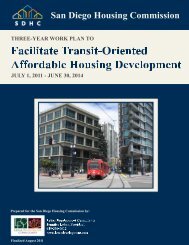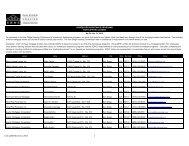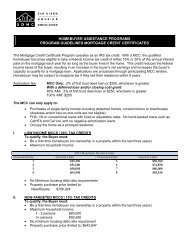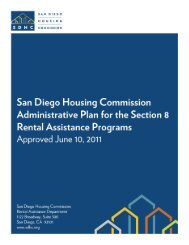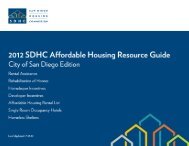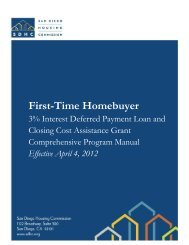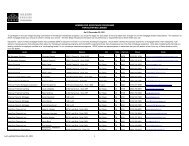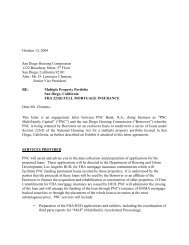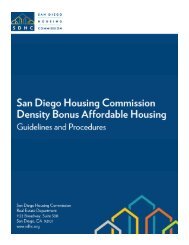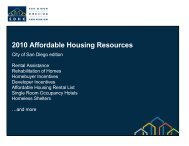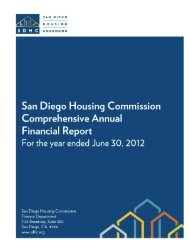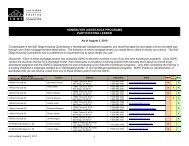Chapter 1 - San Diego Housing Commission
Chapter 1 - San Diego Housing Commission
Chapter 1 - San Diego Housing Commission
Create successful ePaper yourself
Turn your PDF publications into a flip-book with our unique Google optimized e-Paper software.
<strong>Chapter</strong> 11 – Program Terminations and Program Integrity Unit<br />
[24 CFR Part 982, Subpart B, G, I & K]<br />
“Engaged in or engaging in” violent criminal activity means any act by applicants, participants,<br />
household members, or guests which involved criminal activity that has as one of its elements the<br />
use, attempted use, or threatened use of physical force substantial enough to cause, or be<br />
reasonably likely to cause, serious bodily injury or property damage, including lewd and lascivious<br />
acts with a minor, which did or did not result in the arrest and/or conviction of the applicant,<br />
participant, household members, or guests.<br />
The existence of the above-referenced behavior by any household member or guest, regardless of<br />
the applicant or participant’s knowledge of the behavior shall be grounds for denial or termination<br />
of assistance.<br />
If an applicant, a member of an applicant or participant household or an addition to the participant’s<br />
household, including a live-in aide, has been arrested, convicted or otherwise been determined to<br />
have engaged in illegal drug-related or violent criminal activity within the prior five years, admission<br />
or continued participation may be denied. In cases where a family member recently has been<br />
released from incarceration for drug-related activity or violent criminal activity and it has been more<br />
than five years since the activity occurred, SDHC and the family will execute a stipulated agreement<br />
that should engagement in such activity by any household member occur SDHC will issue a Notice of<br />
Intended Action to terminate assistance.<br />
3. Address Match Program (AMP)<br />
SDHC has formed an ongoing relationship with the <strong>San</strong> <strong>Diego</strong> Police Department to identify possible<br />
drug or criminal activities committed by residents of assisted housing units or in assisted housing<br />
units using the Address Match Program reports.<br />
AMP reports will be reviewed to determine if a person suspected of drug or violent criminal activity<br />
is a participant or guest of assisted housing. If the person named in the AMP report is a participant,<br />
guest, or unauthorized household member, a Notice of Intended Action may be issued to terminate<br />
housing assistance.<br />
G. NOTICE OF TERMINATION OF ASSISTANCE<br />
When SDHC decides to terminate assistance, the family will receive a written Notice of Intended Action<br />
to terminate assistance, which states:<br />
- The reason(s) for the proposed termination.<br />
- The effective date of the proposed termination.<br />
- The family's right, if they disagree, to request an Informal Hearing held before termination of<br />
assistance.<br />
- The date by which a request for an informal hearing must be received by SDHC.<br />
1. Required Evidence<br />
Preponderance of evidence is defined as evidence which is of greater weight or more convincing<br />
than the evidence which is offered in opposition to it; that is, evidence which as a whole shows that<br />
the fact sought to be proved is more probable than not. The intent is not to prove criminal liability,<br />
but to establish that the act(s) occurred. Preponderance of evidence may not be determined by the<br />
number of witnesses, but by the greater weight of all evidence.<br />
11-7



